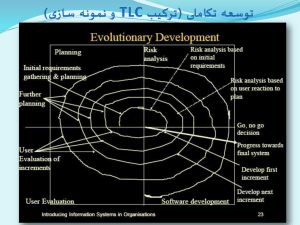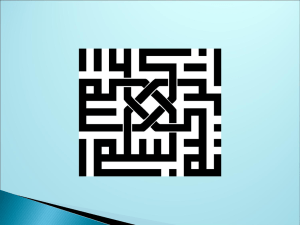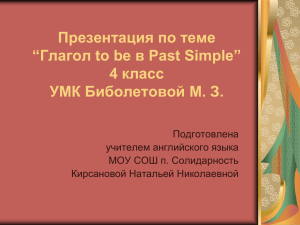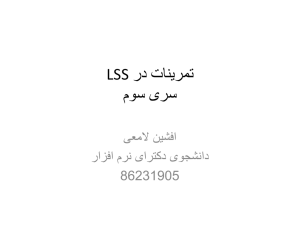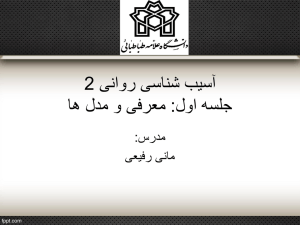قواعد کلی انگلیسی سال سوم راهنمایی نوبت اول{درسهای 1 تا 4}
advertisement
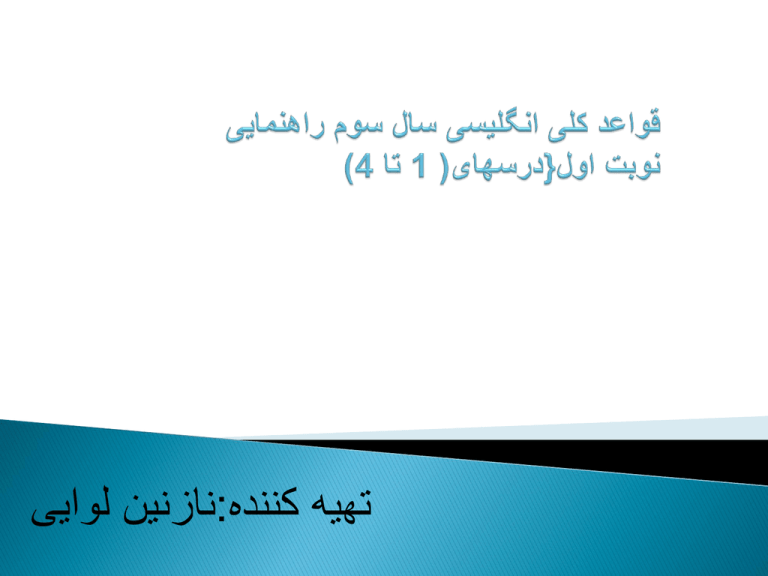
تهیه کننده:نازنین لوایی 1.They are at school. Make question with these sentences. Are they at school? We were at home last night. Were you at home last night? . I You We You 1.She is a dentist. . She isn't a dentist. 2.My Friend was absent yesterday. My friend wasn’t absent yesterday. We They He برایAre و،You برایIs وI برایAm توجه کنید که He برایDoes ولیThey وYou وI برایDo همچنین. استShe It .استWe وShe It of ’ وs کاربرد The+noun+of+the+noun Ali’s book. The legs of the chair. What day is today? . It is Thursday. The days of the week. Saturday Sunday Monday Tuesday Wednesday Thursday Friday 1.I see the cat on the wall. I see It on the wall. . 2.I need some money. Please give me some . Always/usually/sometime/often/never قید های تکرار عبارتند از معمول ا همیشه هرگز اغلب گاهی اوقات :مثال.جای قید های تکرار در جمله بعد از فعل کمکی یا قبل از فعل اصلی است 1.He is late.(always) He is always late. 2.He is goes to school by bicycle. He always goes to school by bicycle. . 1.He eats one apple every day. . 1.How many apples does he eat? ؟ 2.I buy two books every month. . How many books do you buy ? فعل کمکی اسم جمع فعل اصلی ؟ 1.She gives me some money every week. . How much money does she give you every week? 2.There is some water in the glass. How much water is there in the glass? . Uncountable noun Money/Milk/Cheese/Butter/Water/Bread/Meat پول/ شیر/ پنیر/ کره/ آب/ نان/ Rice is 1000 tomans a kilo. How much is rice a kilo? گوشت . چند جمله ی گذشته ی ساده: او بعد از ظهر تلوزیون نگاه کرد. آنها دیروز خانه را تمیز کردند. 1.She watched TV in the afternoon. 2.They cleaned the house yesterday. نشانه های زمان گذشته ی ساده Last year/Yesterday/Last night/Last week/ هفته ی پیش /شب پیش /دیروز /سال پیش . I listened to the radio yesterday. I didn’t listen to the radio yester day. .من دیروز به رادیو گوش ندادم Did you listen to the radio yesterday? Babak studied hard yesterday.(study) ؟ /Id/ اگر در آخر هر فعل با قاعده ای tو dباشد آن را با صدای( /id /اید) تلفظ می کنیم. مثالWanted/needed : /T/ اگر در آخر هر فعل با قاعده ای P/F/K/CH/SH/Sباشد آن را با صدای ( /t/ت ساکن) تلفظ می کنیم.برای حفظ کلماتش نیز می توان از پفک چشس یاچسپ کفش نشانه گذاشت. مثالWashed/watched/asked/helped : /D/ بغیر از موارد بال در بقیه ی جاها آن را با تلفظ(/D/د ساکن) می گوییم .مثال: Closed/Cleaned/Opened

